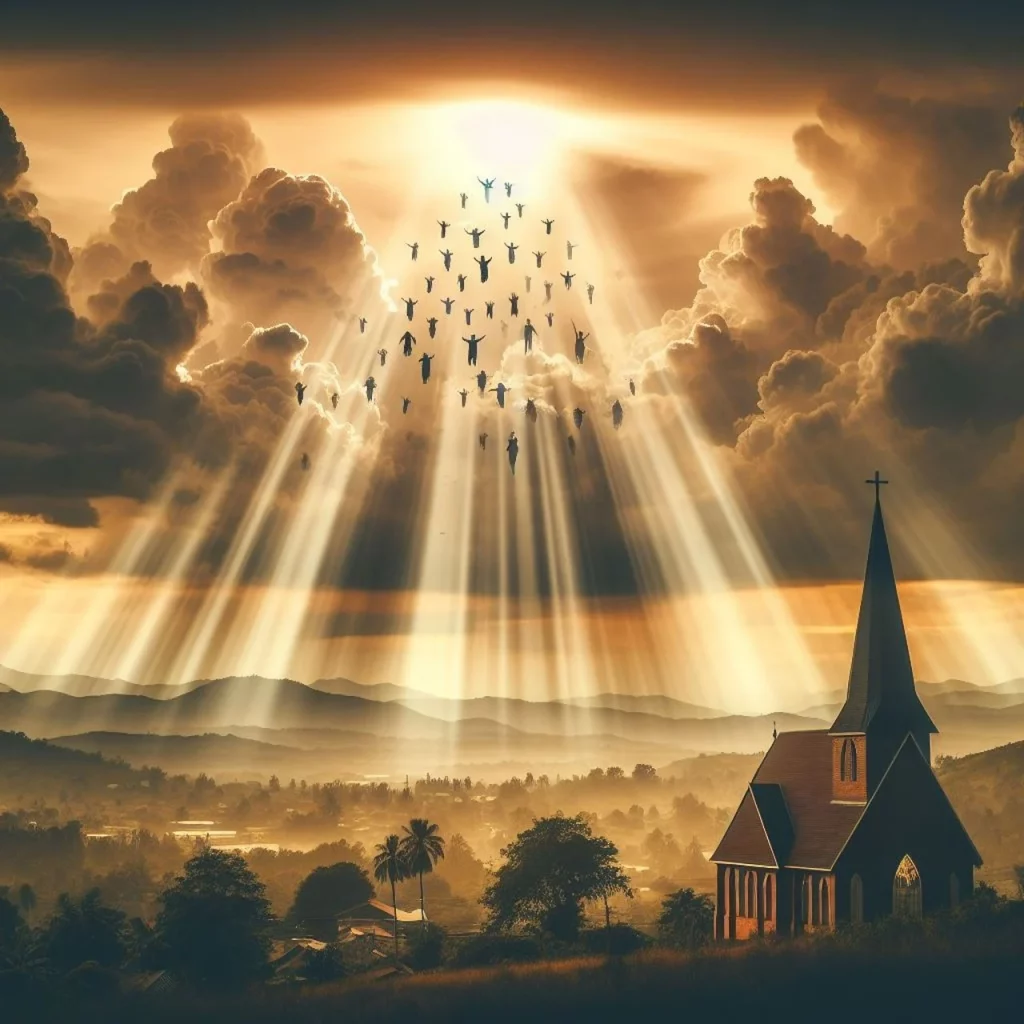Many years ago while still attending a Baptist Church in Frankfort, KY, a friend of mine was excited to pull the backing off a new bumper sticker which read, “In case of rapture, this vehicle will be unmanned.” At the time I had just begun my exploration into the doctrine of a pre-tribulation rapture, and I had little to share on the topic. The only input I had at all was tied to the wheat and tares in Matthew 13.
Because the subject was raised, I pulled out a bible and read that parable, and it’s literal explanation, out loud. The parable (and the literal rendering from Yeshua/Jesus himself) states that the wheat (children of the kingdom) are in the field (the world) and they are growing up along with the tares (children of the wicked one). At the time of the harvest (the end of this world or age), the man who sowed this seed into the world (Messiah Yeshua) will tell the reapers (the angels) to gather together “first the tares” and then the wheat. In this parable the children of God’s Kingdom are not taken first, the children of the wicked one are. The following verse should be noted:
Matthew 13:30 Let both grow together until the harvest
This is significant because Matthew 13:39 tells us plainly that “the harvest is the end of this world.” If the righteous are taken before the tribulation begins, leaving the sinners to wreak havoc on what is left of the world, how can both the Children of the Kingdom of God and the children of the Wicked One be growing together until the end of the world? It is obvious, they can’t be.
This is not the only time we see this in scripture. Yeshua likens the time of his return to the days of Noach and Lot. In the days of Noach, his family was given a place of safe haven (the Ark) during the time of wrath (flooding). When all was said and done, Noach and family remained, they were not taken, they were left behind. The ones taken were those not on the Ark, the unrighteous or the “tares” if you will, they were gone!
Likewise, Lot and his family were moved away from the place of wrath. He too was not removed from the earth, rather, Lot and family were led to a place of safety. When the wrath came it was Lot who was “left behind” as only he remained standing once the smoke cleared.
Another set of verses used to teach that the righteous are taken first is found in Luke 17:34 which states, “I tell you, in that night there shall be two men in one bed; the one shall be taken, and the other shall be left. (35) Two women shall be grinding together; the one shall be taken, and the other left. (36) Two men shall be in the field; the one shall be taken, and the other left.”
However, in very next verse, the disciples asked Yeshua, “Where were those taken, taken to?” Messiah’s reply is, “wherever the body is will be where the scavengers are gathered together.” In other words, where you see the scavenger birds eating the bodies, that’s where they were taken.
Does this mean that there is no rapture at all? Well, not necessarily, there are some verses that would indicate a catching away, but are we really being taken to where so many teach we are taken to? Billions of dollars have been made through books and movies centered on the idea that Christians are taken to heaven and everyone else will be left behind. But if Yeshua clearly states that the wheat and tares grow together until the end, then it is time to reevaluate our understanding, prayerfully of course!
Scripture tells us that the meek inherit the earth, not heaven. Heaven wasn’t made for man, the earth was. Yeshua is returning to set up a Kingdom here on earth. After that time, the New Jerusalem comes down from heaven and fills, for the most part, all the land promised to Abraham and his seed. In other words, with a Kingdom on earth, and the New Jerusalem on earth, and with the meek inheriting the earth, why do we think we go to heaven?
The church took hold of the story about Enoch and say, “this represents the church” because we have nothing else in the Tanach (OT) that ever points to an event of this magnitude. We forget that God has always used tribulation to draw His people closer to Himself, to refine us, to mold us. Yet we seem to see ourselves as special and not having to go through a time of trouble that might actually draw us closer to God and to each other?
The following verses are very much linked. Please take the time to see the connection:
1 Corinthians 15:52 In a moment, in the twinkling of an eye, at the last trumpet: for the trumpet shall sound, and the dead shall be raised incorruptible, and we shall be changed.
1 Thessalonians 4:16 For the Lord himself shall descend from heaven with a shout, with the voice of the archangel, and with the trumpet of God: and the dead in Christ shall rise first: (17) Then we which are alive and remain shall be caught up together with them in the clouds, to meet the Lord in the air: and so shall we ever be with the Lord.
Matthew 24:30 And then shall appear the sign of the Son of man in heaven: and then shall all the tribes of the earth mourn, and they shall see the Son of man coming in the clouds of heaven with power and great glory. (31) And he shall send his angels with a great sound of a trumpet, and they shall gather together his elect from the four winds, from one end of heaven to the other.
The “last trumpet” is when the dead are raised, when we are changed, and when Messiah returns in the clouds. Even according to Matthew 24:29, this is after the Tribulation. It is at that point, when factoring in previously mentioned context, that the tares (children of the wicked one) are taken away first and then the angels are sent to gather God’s elect. What that will ultimately look like? Whether or not a second Exodus occurs1? How does this all break down on a timeline? On some of that I can’t be certain, and on some that will just have to become another article. Suffice to say, if we just lay out the above verses (1 Corinthians 15:52, 1 Thessalonians 4:16 and Matthew 24:29-30) and let them speak for themselves, they seem to do a pretty good job doing just that. If there is a rapture of any kind, it is not until after the tribulation and it sure looks like the Wheat (Children of the Kingdom) are left behind.
- see all of Isaiah 11 but pay close attention to verses 11 through 16. ↩︎





I’m still learning and this was very informative!!
We are all still learning, in fact, the learning never ends.
I’ve not taken a firm position on the Tribulation, post, pre, mid etc. But I guess in order to try to understand what is before us today , and be ready, I should look deeper.
When push comes to shove I don’t really care… it will be what it will be and we should be making sure we can do “today” what is best for those we come in contact with. That said, one reason I shared this article is because many Christians believe they won’t be here at all for the tribulation. If that is true, it isn’t an issue, but if they are wrong then they risk not recognizing the anti-messiah because they don’t believe he will be revealed while they are here. They won’t then, see him for who he is.
Have you looked at Isaiah 11? Especially the last 6-8 verses?
It’s interesting you point out that Christians will be caused to suffer. In Matthew 5 Jesus speaks of the persecuted being blessed because of their suffering. The apostles talked about how they considered themselves blessed of God to be found worthy of trials and tribulation. But then, of course, when you read the Law God promises blessings, prosperity and abundance for obedience.
Just a very interesting observation on the subject matter, especially since I have been challenged with the question, “Can love be known in the absence of suffering?”
Your question is a great one! Can we know good if we do not have evil as a comparison? Love hurts at times, and while I think we can love without suffering, I think love goes to greater levels when we do.
If I had a vote, I would vote pre-trib rapture. But you also raised another great point. The first disciples all suffered, some horribly. Are we better than them? Or the better question, “Are we even worthy to suffer for His namesake?”